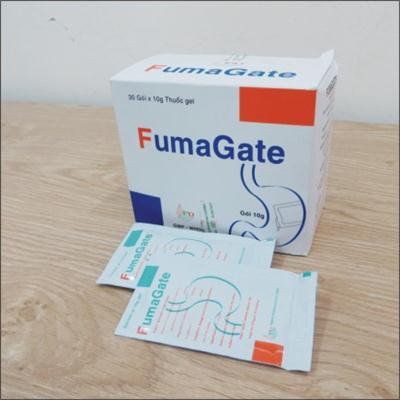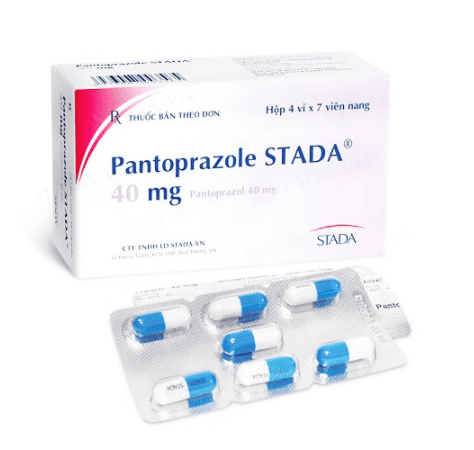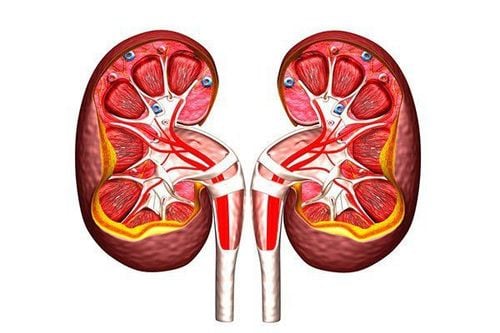This is an automatically translated article.
The article was professionally consulted by Pharmacist Nguyen Thi Linh - Vinmec Danang International General Hospital.Pantoprazol is a medicine used to prevent and treat diseases of the gastrointestinal tract, associated with disorders of increased gastric acid secretion. However, to use pantoprazol safely and effectively, patients should consult their doctor before taking it.
1. What is pantoprazol?
Pantoprazol is a proton pump inhibitor (enzyme H + / K + - ATPase ) found on the surface of gastric parietal cells, preventing acid secretion into the gastric lumen. Therefore, pantoprazole has an inhibitory effect on gastric acid secretion even when the stomach is stimulated by any stimulant.Pantoprazol is available in pill form. The drug is taken orally by swallowing the tablet whole, without chewing or crushing it when taking it.
2. How to use pantoprazol correctly?
The drug pantoprazol is effective in the treatment of diseases of the gastrointestinal tract including: gastroesophageal reflux disease, peptic ulcer disease, Zollinger-Ellison syndrome causing pathological hypersecretion; and prevention of gastric ulcers caused by the use of non-steroidal anti-inflammatory drugs.Below is the dose of pantoprazol prescribed by doctors in the treatment of gastrointestinal diseases, specifically as follows:
Dosage:
Gastroesophageal reflux: 20-40 mg, 1 time / day in the morning for 4 weeks, can be increased to 8 weeks as needed. Treatment may be extended up to 16 weeks in people with esophageal ulcers that do not heal after 8 weeks of treatment. Maintenance therapy: 20-40 mg per day. Benign gastric ulcer: 40mg/day, for 4 to 8 weeks. Duodenal ulcer: 40 mg/day, for 2 to 4 weeks Treatment of peptic ulcer caused by Helicobacter pylori: combination of pantoprazol with antibiotics according to the regimen with the dose regimen of Pantoprazol 40mg, twice daily (morning and evening) Prophylaxis of gastrointestinal ulcers caused by non-steroidal anti-inflammatory drugs: 20mg/day. Zollinger-Ellison syndrome (pathological hypersecretion of acid): Start dose at 80mg/day, then adjust according to patient's response For patients with liver failure: Usually no need to adjust dose but do not use more than 40mg/day For patients with renal impairment: No dose adjustment is usually required. How to use:
The drug is to be taken whole, do not break, chew or break the tablet. Take the medicine 30-60 minutes before eating. It is necessary to adhere to the full medication regimen for the entire course of treatment.

Người bệnh trào ngược dạ dày thực quản
3. Some notes when using pantoprazol to treat gastrointestinal diseases
When using pantoprazol to treat gastrointestinal diseases, it is necessary to note some of the following information:When stopping the drug suddenly, it may cause rebound acid secretion syndrome (rebound). Before taking pantoprazole, the possibility of gastric cancer must be excluded because the drug may mask symptoms or delay the diagnosis of cancer. Pantoprazole should be used with caution in patients with acute and chronic liver disease or a history of liver disease. Be careful in people with kidney failure, the elderly..
4. Who should not use pantoprazol?
The following people should not use pantoprazol:Hypersensitivity to the ingredients of the drug, including pantoprazol or benzimidazole derivatives such as rabeprazole, omeprazole, lansoprazole, esomeprazole. Pregnant women should use caution when using the drug because there are not enough studies on the drug as well as its ability to control well in pregnant women. Women who are breastfeeding should stop breastfeeding or stop using the drug because pantoprazole can be excreted in breast milk, to avoid affecting the baby.

Phụ nữ cho con bú không nên sử dụng thuốc pantoprazol
5. Side effects and medications that may affect the use of pantoprazol
The use of pantoprazol can cause some side effects such as:Abdominal pain, diarrhea Headache Increased blood sugar Test results show abnormalities in liver function

Đau đầu có thể xảy ra sau khi dùng thuốc pantoprazol
Drugs whose absorption depends on the pH of the stomach: Drugs including ampicillin ester, ketoconazole, iron salts , ... if used concurrently with pantoprazol, when gastric pH increases, it may increase or decrease the ability to interact and the extent of drug absorption. Warfarin: Caution should be exercised when pantoprazole and warfarin are used concomitantly because of the potential for increased prothrombin time, leading to the risk of abnormal bleeding and death. Sucralfate: Patients should take pantoprazol at least 30 minutes before taking sucralfate because sucralfate can slow down absorption and reduce the bioavailability of pantoprazole. Pantoprazole is indicated in the treatment of a number of digestive diseases. However, the use of the drug should be noted in some subjects and patients.
Vinmec International General Hospital is one of the hospitals that not only ensures professional quality with a team of leading medical professionals, modern equipment and technology, but also stands out for its examination and consultation services. comprehensive and professional medical consultation and treatment; civilized, polite, safe and sterile medical examination and treatment space.
Customers can directly go to Vinmec Health system nationwide to visit or contact the hotline here for support.
SEE MORE
Gastroesophageal reflux surgery: Things to know How to effectively treat stomach ulcers Infective diarrhea - recognize signs to avoid dangerous complications













